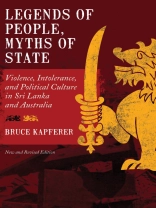The civil war in Sri Lanka and the part that nationalism seemed to play in it inspired the writing of this book some twenty-three years ago. The argument was developed through a comparative analysis of nationalism in Sri Lanka with the author’s native Australia. At the time this constituted an innovative approach to comparison in anthropology, as well as to nationalism and its possibilities. It was not based on differences but on the way in which perspectives from within the two nationalisms, when seen side-by-side, could present an understanding of their implication in producing the violence of war, racism, and social exclusion. The book has lost none of its importance and urgency as proven by the chapters in the Appendix, written by top scholars working in Sri Lanka and in Australia. These contributions bring together new material and critically explore the book’s themes and their continued relevance to the various trajectories in nationalist processes since the first publication of the book.
Spis treści
Preface to the New and Revised Edition
Preface to the Paperback Reissue
Introduction
Chapter 1. Cultures of Nationalism: Political Cosmology and the Passions
Part I: Evil and the State: Sinhalese Naitonalism, Violence, and the Power of Hierarchy
Chapter 2. Ethnic Violence and the Force of History in Legend
Chapter 3. Evil, Power, and the State
Chapter 4. Ideological Practice, Ethnic Nationalism, and the Passions
Part II: People Against the State: Australian Nationalism and Egalitarian Individualism
Chapter 5. When the World Crumbles and the Heavens Fall In: War, Death, and the Creation of Nation
Chapter 6. But the Band Played “Waltzing Maltilda”: National Ceremonial and the Anatomy of Egalitarianism
Chapter 7. Ethnicity and Intolerance: Egalitarian Nationalism and Its Political Practice
Chapter 8. Nationalism, Tradition, and Political Culture
Notes
References
O autorze
Bruce Kapferer is Professor of Anthropology at the University of Bergen. He has held academic positions in Zambia, Manchester, Adelaide, London, and Queensland and carried out extensive fieldwork in Zambia, Sri Lanka, India, Australia, and South Africa.












